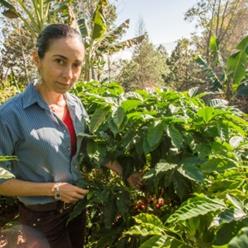
Featured Origin: Honduras - Organic Aida Escolan - (COCAFELOL)
Share
Grab your travel mugs, we're off to Ocotepeque, Honduras. A little place that used to be known as the banana republic but we think it should be awarded the title the coffee republic as their coffee is pretty damn delish!
So why are we virtually travelling to Honduras I hear you ask? Well, we have a limited edition single origin called Aida Escolan (after the farmer who grows it) that has notes of dark chocolate, orange and stone fruit upfront and a heavy creamy body with roasted almonds to finish.
But before we drown in our own drool after reading that description, let me tell you a bit more about the guys, or more accurately the lady that is growing the beans.
Aida Escolan (the bean not the woman) comes from Cerro Grande Farm in La Labor, Ocotepeque which sits at the lofty heights of 1481 metres above sea level. Aida (pictured) has taken on the challenge of keeping the heritage of her ancestors alive by pursuing her passion for coffee with a huge focus on quality.
In addition to her focus on growing multiple varietals of coffee with a good profile in the cup, Aida keeps busy with diversifying the farm with timber and fruit trees. It is through the help of the local Honduran people that Aida is able to cover off the heavy workload through each season so it’s important to her (and us!) that she looks after her staff and focus’ on in improving their quality of life.
So back to our beans. Only the ripest fruit is carefully picked by Aida’s team. The cherry is then taken to the home mill where the coffee is pulped and fermented in water tanks for 24 hours. The drying is completed in greenhouse style solar dryers on raised beds. When the parchment is at 12% moisture content it is sent to Beneficio Santa Rosa, a dry mill and exporter in Santa Rosa de Copan in preparation for export. Then once it hits Australia it's into our roaster and then your cup.
But wait, that’s not the end of it. Through the harvest process, there are some waste products that need to be disposed of.
After harvest, Aida’s team use the coffee waste to make organic fertiliser with pulp processed by the Californian red worm into compost.
If a socially responsible, dark chocolate flavoured coffee that is enjoyed by most people (and the Californian red worm) sounds like your thing then hop over to our website and grab a bag Organic Honduras - Aida Escolan
